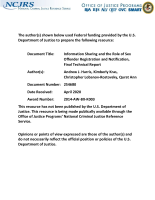Impact of Prison Reentry Services on Short-Term Outcomes: Evidence From a Multisite Evaluation
Journal
Evaluation Review
Date Published
January 2014
Agencies
NIJ-Sponsored
Publication Type
Program/Project Evaluation


